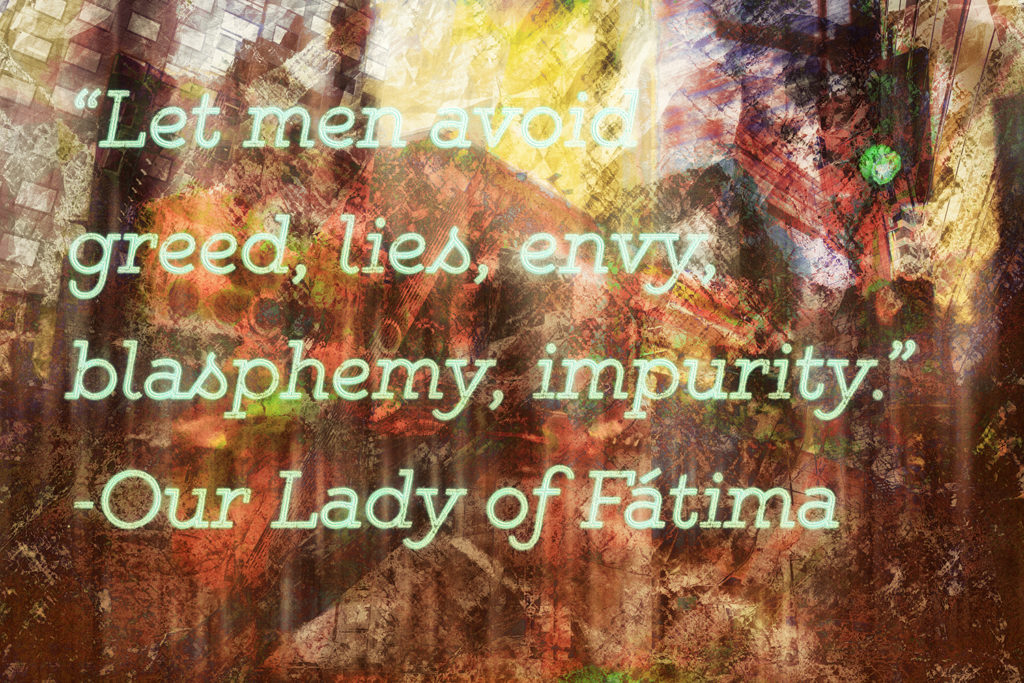(from the book “The Hidden Power of Kindness” by Father Lawrence G. Lovasik)
St. John says, “Do not love the world or the things in the world. If anyone loves the world, love for the Father is not in him. For all that is in the world, the lust of the flesh, and the lust of the eyes, and the pride of life, is not of the Father, but is of the world. And the world passes away, and the lust of it; but he who does the will of God abides forever.” (1 John 2:15-17)
If there is even a shred of greed in your heart, ask our Lord for the grace to overcome it and instead to fill your soul with an ardent desire for the things of God, which will enrich your soul and win for you an eternal reward. Envy is sadness over the good fortune of others. Envy, which is rooted in pride and vanity, is sadness over the good fortune of another because that good fortune stands in the way of something that one desires for oneself. This undue appropriation to self of honor, esteem, position, power, and all that leads to it—money, talent, education, personality, or even the grace of God—may be incentives to envy.
You are guilty of envy if you let your disappointment make you bitter and unkind, or induce you to scheme against those who have gotten ahead of you. The natural law and the tenth commandment—”Thou shalt not covet thy neighbor’s goods”—stand against this tendency of human nature.
St. Paul says, “Love is not envious.” (1 Corinthians 13:4) St. Augustine considers envy a monstrous vice. St. Thomas holds that it can be grievous, although, on account of trifling matter or lack of deliberation, it is usually only venial. But regret at another’s success is not always wrong. The motive prompting it is the determining factor. It is excusable to be grieved because an influential person, openly hostile to the Church, is placed in a position of power, or if great wealth comes to a person who will abuse it. Envy is the exact contrary of charity in thought, feeling, desire, and conduct. We are members of the Mystical Body of Christ and, in consequence, we must be mutual helps and supports to one another. Envy makes this impossible.
Love rejoices in good wherever it finds it; envy is pained by good, and the sight of the happiness of others hurts the eyes and the heart of the envious man. Love wishes to give; envy would rather receive. Love creates; envy destroys. Love builds up; envy pulls down. Love helps those in need, comforts the afflicted, and strives to turn all that is evil into good; envy would turn the little happiness to be found in this world into evil, sorrow, and pain. Joy at another’s misfortune, really revengefulness and spite, almost invariably accompanies envy. None of this is derived from our Father in Heaven, Who is infinite goodness and Who can rejoice only in what is good. Delight in another’s misfortune owes its origin to the Devil, who, in the depths of his own misery, knows no other pleasure than that which he finds in our pain.
The evil effects of envy are very great. Envy disrupts social life generally. It sets the child against the father, brother against brother, neighbor against neighbor, and nation against nation. It kills friendship, undermines business relations, and hinders reconciliation. It is one of the chief sources of misunderstanding, criticism, hatred, vengeance, calumny, detraction, and perverse attacks on private life. Envy and greed, the source of the world’s unrest and wars, are sins against charity, because they make us seek what belongs to others.
Often, even at the cost of harm to our neighbor, we want what does not belong to us. But the most harmful consequences fall on the envious individual himself. Of all the passions, envy is the only one that yields nothing but pain. Envy has no reward for men. It gives no gratification, like lust or pride, but augments misery. Envy is like a gnawing worm that destroys peace of mind and health of body. It deteriorates character by filling the soul with despondency. The envious person becomes distrustful, unjust, and suspicious. Envy makes its victims ill-tempered, sad, and unapproachable. The malice of envy is best recognized in the fall of the angels. They were cast out of Heaven because they envied God.
The book of Wisdom says, “Through the Devil’s envy, death entered the world.” (Wisdom 2:24) Our first parents were the victims of Lucifer’s envy. Envy caused the first death in human history. Picture the terror of Abel when he beheld his brother, his face distorted by envy, about to deal him the murderous blow, and the grief of mother Eve when her blood-stained child was laid at her feet (cf. Genesis 4:8). Or think of the gnawing anguish with which the dark envy of King Saul filled the life of youthful David (cf. 1 Samuel 18:8-9).
Jealousy implies the fear of being displaced by a rival, or of being deprived of that which is rightfully ours or of that which we think ought to be ours. Jealousy is another form of envy. Jealousy has to do with our own possessions, whereas envy has to do with the possessions of others. We resent an intrusion about that which belongs to us, and we are prone to become revengeful on account of this disregard of our rights and claims.
Jealousy goes a step further than envy; it not only tries to lessen the good opinion others enjoy and criticizes those who are praised and rewarded, but is characterized by an excessive love of our own personal good and brings on a fear that we will be deprived of it. Jealousy prefers to see the good left undone rather than to lose a single degree of praise. Recognize the effects of jealousy. Jealousy is rooted in pride and, therefore, can become a hotbed where other vices grow. Hatred springs from jealousy, and the fruits of hatred are calumny, detraction, and rash judgment. Gossip is stimulated by jealousy and becomes the instrument by which characters and reputations can be harmed. Jealousy can drive men to excess in work, ambition, and the quest for riches and even cause them to use questionable means to surpass their rivals. Thus loyalty and justice suffer. When jealousy is not satisfied, there is no peace of soul, but anguish and unhappiness.
Features of your character sometimes reveal themselves sharply during the playing of games, either of skill or of chance. To be able to lose a game with good grace and unaffected charity and humility is a sign of your willpower and dominance over pride and passion. If you are a poor loser, you will reveal your weakness of willpower by angry accusations against the winner, or by placing the blame for your failure on a partner or teammate or innocent bystander, or by showing great unhappiness and gloominess. If you are a good loser, you recognize that games are intended for recreation and enjoyment, and that neither winning nor losing should be taken too seriously. Above all, you know that if the turn of fortune in a game robs you of peace or induces you to be unkind to others, then the game has defeated its purpose. You will also see that at times it is good for your humility for you to lose a game, and you should be thankful for the spiritual good that arises from a defeat….
St. Paul says, “Let each one not consider the things that are his own, but those that are other men’s,” (cf. Philippians 2:4), and, “Let all men know your forbearance” (Philippians 4:5). Forbearance indicates that virtue by which you are content not to demand all to which you have a claim in strict justice. St. Paul reminds us that Christ Himself has willingly relinquished His rights: “Rather, He emptied Himself, taking the form of a servant, being born in the likeness of men” (Philippians 2:7).
Vainglory is an expression of envy and jealousy and, therefore, an obstacle to brotherly love. Vainglory is an inordinate regard of self. It is self-conceit, the overestimation of one’s powers—social position, learning or talent, or skill or ability. Self-love is so strong a tendency that you may be carried away by it to the extent of embittering your life and, consequently, rendering yourself truly miserable. St. Paul considers vainglory an obstacle to brotherly love. “Love is not arrogant or rude. Love does not insist on its own way.” (1 Corinthians 13:4-5)
Anyone who permits himself to be governed by vainglory easily arouses resentment in others. Anyone who fails to impress others by his own worthless pomp easily becomes a victim of envy himself. Try to see how vainglory tends to belittle the good you do possess; how it tends to make you untrue, unhappy, and ridiculous in the eyes of others; how it spoils your character. You have received great favors and unmerited blessings from God. Of yourself, you are and have nothing, except sin. Left to yourself, you would be a slave to passion. Whatever is good in you is really due to the working of grace in your soul. Therefore, humility and gratitude should be natural to you.
Christ did not seek the esteem and praise of men. He sought only His Father’s honor. By His way of life, He evoked the sharp criticism and bitter hatred of His own nation. Only true humility could stand that test of virtue. St. Paul says, “Christ did not please Himself, but, as it is written, ‘The reproaches of those who reproached Thee fell upon me.’ ” (Romans 15:3) Rather than pursue the esteem and recognition of men, seek the esteem of Christ through humble use of the talents He has given you. You will really want that esteem in the hour of your death. The psalmist says, “Not to us, o Lord, not to us, but to Thy name give glory” (Psalm 115:1).
Ask the Holy Spirit for the grace necessary to overcome the petty jealousies and expressions of vainglory that often mar the luster of your charity. Sinful envy, jealousy, and vainglory are traceable to pride and greed, resulting from wounded self-love or undue self-esteem. These are passions that manifest themselves daily in human contacts. They exercise a great influence on human thoughts and desires. They modify feeling and control conduct. They are responsible for many sins of uncharitableness and many of the anxieties that rack the souls of men. The sign of a true Christian is that he loves God and loves his neighbor as himself. Greed, envy, and jealousy breed hate, not love; hence, they have no place in the life of a follower of Christ.







Thanks Great information.